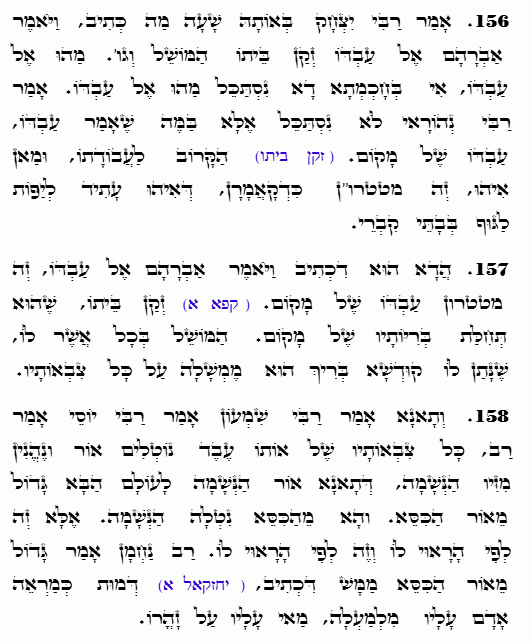Daily Zohar # 4707 – Chayei Sarah – The light of the soul is greater than that of the Throne
Daily Zohar 4707

Hebrew translation:
157. זֶהוּ שֶׁכָּתוּב וַיֹּאמֶר אַבְרָהָם אֶל עָבְדּוֹ, זֶה מטטרו”ן עַבְדּוֹ שֶׁל מָקוֹם. זְקַן בֵּיתוֹ, שֶׁהוּא תְחִלַּת בְּרִיּוֹתָיו שֶׁל מָקוֹם. הַמֹּשֵׁל בְּכָל אֲשֶׁר לוֹ, שֶׁנָּתַן לוֹ הַקָּדוֹשׁ בָּרוּךְ הוּא מֶמְשָׁלָה עַל כָּל צִבְאוֹתָיו.
158. וְלָמַדְנוּ, אָמַר רַבִּי שִׁמְעוֹן אָמַר רַבִּי יוֹסֵי אָמַר רַב, כָּל צִבְאוֹתָיו שֶׁל אוֹתוֹ עֶבֶד נוֹטְלִים אוֹר וְנֶהֱנִים מִזִּיו הַנְּשָׁמָה. שֶׁלָּמַדְנוּ, אוֹר הַנְּשָׁמָה לָעוֹלָם הַבָּא גָּדוֹל מֵאוֹר הַכִּסֵּא. וַהֲרֵי מֵהַכִּסֵּא נִטְּלָה הַנְּשָׁמָה? אֶלָּא זֶה לְפִי הָרָאוּי לוֹ, וְזֶה לְפִי הָרָאוּי לוֹ. רַב נַחְמָן אָמַר, גָּדוֹל מֵאוֹר הַכִּסֵּא מַמָּשׁ, שֶׁכָּתוּב (יחזקאל א) דְּמוּת כְּמַרְאֵה אָדָם עָלָיו מִלְמָעְלָה. מַה זֶּה עָלָיו? עַל זָהֳרוֹ.
.
Zohar Chayei Sarah
Continued from previous DZ
#156
Rabbi Yitzchak said, “At that moment, what is written? “וַיֹּאמֶר אַבְרָהָם אֶל עַבְדּוֹ זְקַן בֵּיתוֹ הַמּוֹשֵׁל ” ‘And Abraham said to his servant…’ (Genesis 24:2). What is the meaning of “אֶל עַבְדּוֹ” ‘to his servant’? If we examine this through the aspect of the resurrection of the dead, what does it mean ‘to his servant’? For Abraham represents the soul, as previously stated (#141). Thus, ‘And Abraham said to his servant’ would refer to the servant of the soul. But where do we find that the soul has a servant?”
Rabbi Nehorai answered, “We should not focus on the idea of a servant belonging to Abraham as the text might seem to imply. Instead, it refers to the servant of Hashem, one who is close to His service. And who is that? It is Metat–, as we have explained, who is destined to beautify the body in the grave.
#157
This is the meaning of the verse: “And Abraham said to his servant” (Genesis 24:2). This refers to Metat–, the servant of Hashem.” זְקַן בֵּיתוֹ” “The elder of his household”—because he was the first of creations. “הַמֹּשֵׁל בְּכָל אֲשֶׁר לוֹ” “Who ruled over all that he had”—this means that the Holy One, Blessed be He, gave him authority over all His hosts, that is, over all the heavenly angels.
#158
We have learned that Rabbi Shimon said in the name of Rabbi Yose, quoting Rav: “All the hosts of that servant (Metat–) derive light and enjoy the radiance of the soul.” For we have learned that the light of the soul is greater than the light of the Throne, meaning the Holy Throne. While the angels derive their light from the Throne, the light of the soul surpasses that of the Throne.
The question arises: “But the soul derives its light from the Throne, and it is a principle that the receiver is lesser than the giver?” The answer is given: “This depends on what is appropriate for each. The Throne gives according to its capacity, and the soul receives according to its merits.”
Rav Nachman said: “It is truly greater than the light of the Throne,” as it is written: “דְּמוּת כְּמַרְאֵה אָדָם עָלָיו מִלְמָעְלָה” “The likeness of the appearance of a man was above it” (Ezekiel 1:26). What does “above it” mean? It refers to the radiance of the man. In spiritual terms, “above” does not signify time or physical space but a higher degree of spirituality. Thus, the light of the soul is greater than that of the Throne because the soul originates from the secret of the man who sits upon the Throne, as explained.
Notes:
The Zohar highlights the exalted status of the soul, teaching that its radiance surpasses even the Throne of Hashem from which it derives light. This paradox is resolved by understanding that the soul’s origin, rooted in the man who is part of the Throne, grants it a higher level than its immediate source.
This teaching emphasizes the soul’s unique connection to the divine and its role in channeling divine light to creation. The passage inspires a deeper appreciation for the soul’s sacred nature, reminding us of its profound origin and capacity to reflect divine greatness, surpassing even the higher levels.
{||}

 Previous: Chayei Sarah
Previous: Chayei Sarah

